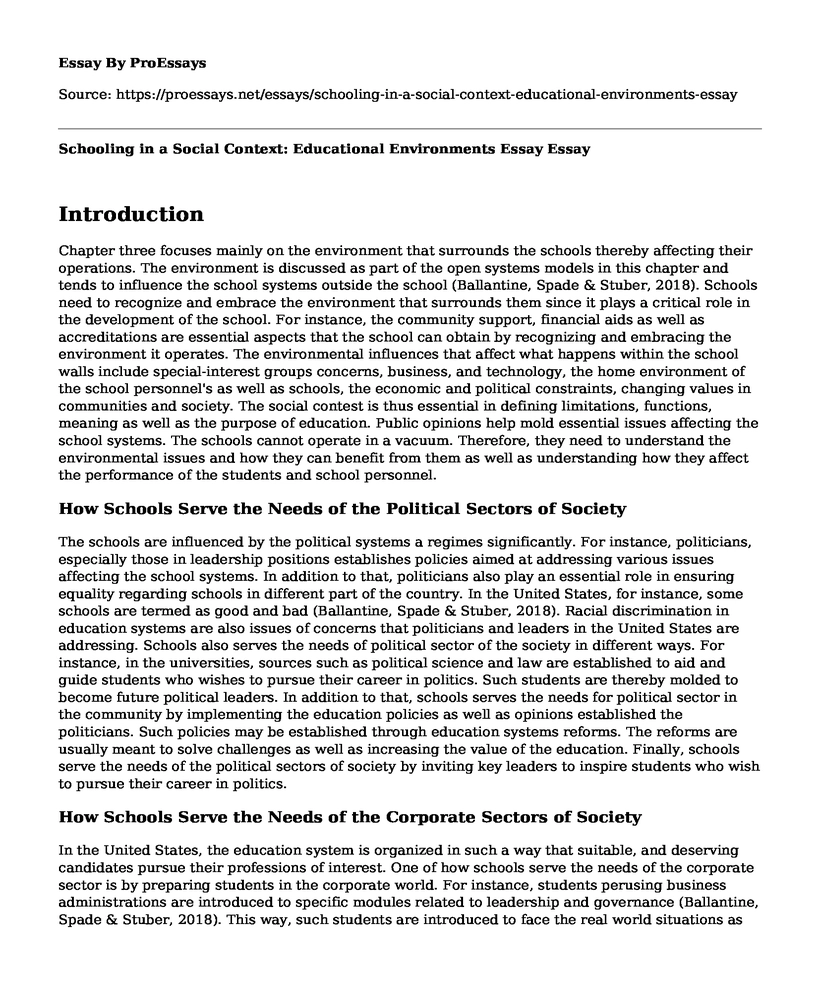Introduction
Chapter three focuses mainly on the environment that surrounds the schools thereby affecting their operations. The environment is discussed as part of the open systems models in this chapter and tends to influence the school systems outside the school (Ballantine, Spade & Stuber, 2018). Schools need to recognize and embrace the environment that surrounds them since it plays a critical role in the development of the school. For instance, the community support, financial aids as well as accreditations are essential aspects that the school can obtain by recognizing and embracing the environment it operates. The environmental influences that affect what happens within the school walls include special-interest groups concerns, business, and technology, the home environment of the school personnel's as well as schools, the economic and political constraints, changing values in communities and society. The social contest is thus essential in defining limitations, functions, meaning as well as the purpose of education. Public opinions help mold essential issues affecting the school systems. The schools cannot operate in a vacuum. Therefore, they need to understand the environmental issues and how they can benefit from them as well as understanding how they affect the performance of the students and school personnel.
How Schools Serve the Needs of the Political Sectors of Society
The schools are influenced by the political systems a regimes significantly. For instance, politicians, especially those in leadership positions establishes policies aimed at addressing various issues affecting the school systems. In addition to that, politicians also play an essential role in ensuring equality regarding schools in different part of the country. In the United States, for instance, some schools are termed as good and bad (Ballantine, Spade & Stuber, 2018). Racial discrimination in education systems are also issues of concerns that politicians and leaders in the United States are addressing. Schools also serves the needs of political sector of the society in different ways. For instance, in the universities, sources such as political science and law are established to aid and guide students who wishes to pursue their career in politics. Such students are thereby molded to become future political leaders. In addition to that, schools serves the needs for political sector in the community by implementing the education policies as well as opinions established the politicians. Such policies may be established through education systems reforms. The reforms are usually meant to solve challenges as well as increasing the value of the education. Finally, schools serve the needs of the political sectors of society by inviting key leaders to inspire students who wish to pursue their career in politics.
How Schools Serve the Needs of the Corporate Sectors of Society
In the United States, the education system is organized in such a way that suitable, and deserving candidates pursue their professions of interest. One of how schools serve the needs of the corporate sector is by preparing students in the corporate world. For instance, students perusing business administrations are introduced to specific modules related to leadership and governance (Ballantine, Spade & Stuber, 2018). This way, such students are introduced to face the real world situations as well as challenges.
The Role of Evaluations in Maintaining the Bureaucracy
In the United States, educational bureaucracies present themselves as organizations that embody the purpose of education in their structure. They do not present themselves as unit aimed at serving education (Ballantine, Spade & Stuber, 2018). The reason why the bureaucracies assume their dominance and emergence can explain jurisdiction over education institutions. The possible explanation is that modern schools in the United States produced education for society. The role of evaluation in maintaining bureaucracy is to ensure that quality education is attained. This can only be achieved by implementing as well as formulating policies aimed at addressing various problems that affect schools.
Conclusion
In conclusion, schools in the United States operates in an environment that affects their operations. Understanding this environment is critical in maintaining the needed support and addressing the problems that affect the school systems. Bureaucracies in education need to be evaluated in maintaining the quality of education.
Reference
Ballantine, J., Spade, J., & Stuber, J. (2018). Schools and society (6th ed.). Sage Publications.
Cite this page
Schooling in a Social Context: Educational Environments Essay. (2022, Aug 15). Retrieved from https://proessays.net/essays/schooling-in-a-social-context-educational-environments-essay
If you are the original author of this essay and no longer wish to have it published on the ProEssays website, please click below to request its removal:
- Communications and Emotional Intelligence Essay
- Strategies in Learning and Using a Second Language Paper Example
- Nonverbal Communication Tools and Distances Between People Paper Example
- What is Freedom? - Essay Sample
- Paper Example on Understanding Risk Factors for Childhood Disorders: Behavior-Change Theoretical Framework
- Article Review Sample on Culture, Power & Hegemony: Gramsci's Influence on Lear's Argument
- Chinese Scientist 'Playing God': Ethical Debate Over Creation of HIV-Resistant Babies - Free Paper Sample







